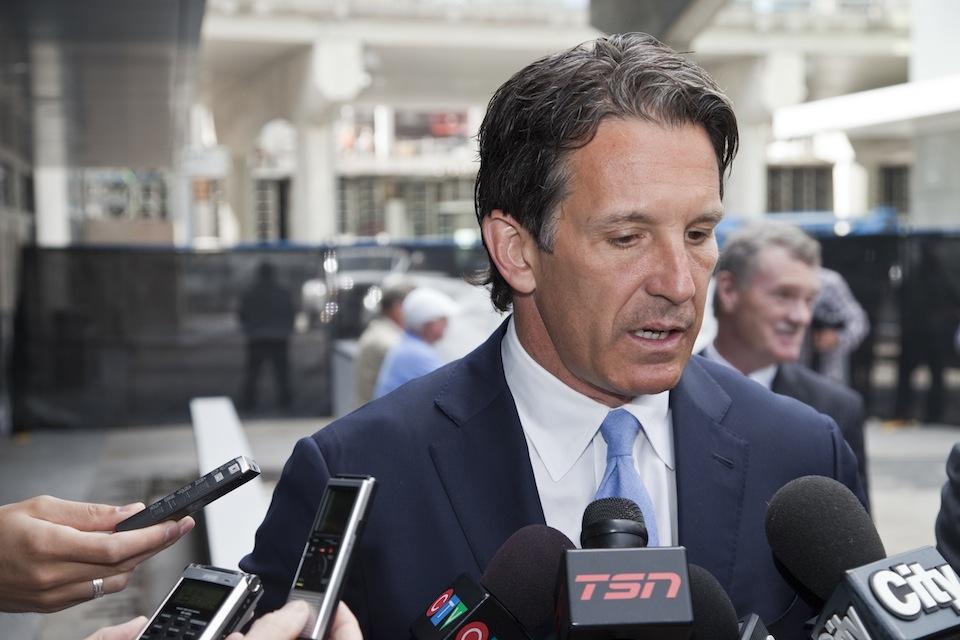Brendan Shanahan addressed the media after the NHL Board of Governors meetings on Tuesday, discussing the NHL’s four-point conduct plan to eliminate abusive behaviour in the sport as well as the incident with Mike Babcock and Mitch Marner during the 2016-17 season.
What did you make of the messaging from the league and the plan in place to move forward and provide more training and outlets for players?
Shanahan: It’s time. I think that it was a great first step. The recognition that, even though some things have occurred and some things have come out, we could possibly learn from this and grow from this, be leaders in our sport — not just for the National Hockey League, but for youth sports in general. Times are evolving. We have to evolve. I think that, obviously, we have all come from a generation where there are certain things that have occurred and occurred to us and occurred to us as players that you just sort of accepted. Like I said, I think that we all have to do a better job of just creating that kind of work environment on the ice and off the ice that is more with the times.
What was the reaction in the room among the owners and managers — is it something that seems like it was well accepted?
Shanahan: More than just accepted. It was appreciated. It was encouraged. It is where we all know we have to get to with the place that we have as leaders in sports. I think the focus was just less on the past and more on what we can do here to be better going forward.
It is an important time in society. I think it is an important time in sports in general. Certainly, rather than be of a position where you want to hide from things or avoid things, I think when we get in a group setting like this and we have leadership from the NHL and leadership from all of the NHL teams that want to be a part of change, it is something that is not just restricted to the sport of hockey but society in general. Where we can be leaders in sports, I think that is important as well.
It is a highly competitive sport. It is a highly competitive environment. There are very real and high emotions, but that is no excuse to not create those sort of inclusive and safe work places so that people can compete but we can also do it in a way that we are proud of ourselves looking back.
Since Mike Babcock has been fired, he has been linked to the Bill Peters situation and the Marc Crawford situation. Do you have a comment on that?
Shanahan: I think it’s a little dangerous when you just start linking everyone together. I don’t know why. I think you have to look at each specific case on its own. I think it’s a little unfair to just group everybody in all in one. I do think it reflects that players today are more equipped and better equipped at communicating how they want to be motivated. We have to listen to them. I think that is something that coming out of a meeting like this and going forward, the challenge for us with the four-point plan that Gary has come up with, it would be to adhere to that and grow from that.
Again, like I said, more importantly, what does this do not just for the NHL, but what does this do for youth hockey — boys and girls — and what does this do for sports?
There were comments from Johan Franzen and Chris Chelios about incidents when they played for Mike. You obviously played for Mike’s team and also brought Mike to Toronto. What are your thoughts on those comments?
Shanahan: Yeah, I played with Johan Franzen. I played with Johan Franzen for Mike Babcock. He was my coach then as well. I sat with Johan a couple of years ago at a game in Detroit and we just talked about things in general. It never came up. I don’t dispute for a second that Johan is telling an experience that did in fact happen. He and I and many others come from a generation, obviously, where we didn’t speak about that stuff immediately. Now, I think players are choosing to speak up more often. I applaud him for having the courage to do that.
It wasn’t something I was aware of. It wasn’t even something where I was on the team when this occurred. It wasn’t something that even when he and I had spoken that he brought up to me. The fact that people are taking the time now to get things off their chest is very important.
If a team were to call you now and say, “We are thinking of hiring Mike Babcock,” what would you say to that team?
Shanahan: I think that is sort of a hypothetical I wouldn’t want to get into, quite honestly. Much was made of the incident with Mike a few years ago with Mitch Marner, for instance. I know our general manager at the time had called and let me know about it right away and I addressed it right away with Mike. Mike apologized to Mitch. There was communication with our General Manager at the time and the agent and the family. It wasn’t something that was appropriate or acceptable to us.
Since then, whether it was Lou or Kyle, our GM has never come to us with a situation like that, but absolutely, is it a highly-charged atmosphere? Is it an atmosphere where players and coaches can all sometimes want to go back and do things a little bit better? Absolutely. But I think this is a good starting point. I think some of the league’s plans and some of the education that we should all have available to us could certainly be a help.
Elliotte Friedman on BOG Meetings, NHL’s four-point plan
Friedman on the NHL stepping in on future cases similar to Babcock-Marner:
We talked to Brendan Shanahan today about Mike Babcock and Mitch Marner. He said at the time, it was dealt with between Shanahan, Lou Lamoriello, the coach, the player, and the family. That was the way things got dealt with. Everything was, “We handle it ourselves.” That is not going to happen anymore. I think teams got that message loud and clear. I think we all understand we are getting a new, big story almost on a daily basis. Everybody understands until all of this gets shaken out, this is where we have to go. I don’t think there is much choice.


































